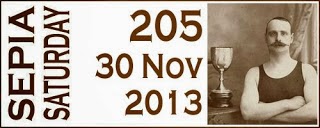I know its still Movember, but this week I've decided to concentrate instead on the fact that the man in the prompt photo has his arms folded, because I really like the following shot of my late father-in-law Bob Featherston, left, and his brother-in-law Win Vail with his arms folded, taken when they were in relaxed mode, on the promenade surrounding the Eastern Beach Swimming Enclosure in Corio Bay, Victoria.
Eastern Beach has been a popular area for swimming and family picnics since its establishment in the 1930's. According to the article below, the shark-proof enclosure was opened by the acting Mayoress of Geelong on Tuesday 28 March 1939. It includes a diving platform, a promenade level and a lower level for swimmers, with a children's playground and paddling pool nearby. Surrounding terraces, kiosk and dressing sheds, were designed in the Art Deco style that was popular around that period.
 |
| Robert Leslie Featherston and Henry Winton Vail at Eastern Beach, c. 1946 |
 |
| Item from the Argus newspaper, 29 March 1939, found in Trove |
 |
| These two photographs from the State Library of Victoria show Eastern Beach thronged with crowds, c. 1939 |
I'm not sure exactly when the photograph of Bob and Win was taken, but I think it's likely to have been around 1946 or 47, when both men were aged around thirty. The smiles and casual poise of these two young men in their bathers belie a considerable amount of courage, bravery and life experience, with both men having not long returned from service in World War 2.
Winton Vail was a Melbourne boy who married Bob's sister Jean in May 1946, after serving with the Australian Army in Europe during World War 2. Bob Featherston was born and educated in Geelong. He was a young teacher at a small country school when the war began, and was one of the first to volunteer for aircrew. He obtained his wings with the Royal Australian Air Force, and was serving in Squadron 12, RAF Bomber Command, when his Lancaster was shot down over the Baltic Coast on 17 January 1943. Bob was captured and held as a prisoner of war for over two years in Stalag V111B at Lamsdorf and Stalag Luft 111 in Sagan, Poland. When finally liberated by the Americans after surviving the Long March from January to April 1945, Bob found his way to to England, where he met his English bride Mary. They were subsequently married in January 1947, back home in Geelong Australia. Bob was always loathe to speak about his experience as a POW.
Just a year or so before enlisting, Bob had also shown considerable bravery when he had been involved in a beach rescue at Ocean Grove, a surfing beach on the Bellarine Peninsula near Geelong. Here is a report of what took place on Saturday 6 January 1940.
 |
| Report published in The Riverine Herald, Echuca and Moama, 9 January 1940, found on Trove. |
Sadly the body of young James Wilksch was never found. At the inquest the coroner complimented both Bob and Mr Hames for their prompt action in going to the aid of the boys, saying that if they had not done so, many more lives would have been lost.
Over the years the boardwalk around the Eastern Beach swimming area deteriorated and was in need of repair, so in the early 1990s members of the public were invited to participate in funding its refurbishment, by sponsoring plaques to be placed on replacement planks for the boardwalk on which Bob and Win were standing. Bob's other sister Dawn Featherston thought this was a good idea, no doubt having happy memories of family visits to the beach, and she paid for plaques for her parents Joseph and Grace, and for herself and her siblings Bob and Jean. Dawn passed away in 1995, and neither she nor her parents have any other physical memorial.
 |
| Plaque at the beginning of the Promenade |
 |
| The Featherston family plaques |
Here is a relatively recent photo taken at Eastern Beach, showing some of the painted bollard figures that are to be found scattered all around the bay. There are 111 of them in total, all sculpted by artist Jan Mitchell and installed around 1999. Ms Mitchell did extensive research before creating them, and they represent various famous figures and local characters in period costume who feature in the history of the Geelong district. The group pictured is entitled the Town Baths Swimmers Club, and shows how men's swimming costumes developed. Originally when the beach inspectors weren't looking, the men would slip their arms out of their singlet tops and roll them down to the waist, as reported in this item found on Trove from the Argus newspaper dated 15 December 1937.



Neither Bob nor Win nor Dawn was around to see the bollards, but one of Bob's granddaughters can be seen posing with the figures above, and the boardwalk comprising hundreds of sponsored planks can be seen in the distance. Jan Mitchell passed away in 2008, and appropriately a bollard depicting her has subsequently been created and added as the final bollard in the collection.
If you are interested, a large number of photographs of many more bollards seen around Corio Bay can be found on
Flickr, and by the way, quite a few of them have moustaches!
Now click
here for many and varied takes on the photographic theme for Sepia Saturday 205.



















.JPG)












.JPG)



.JPG)


.JPG)














